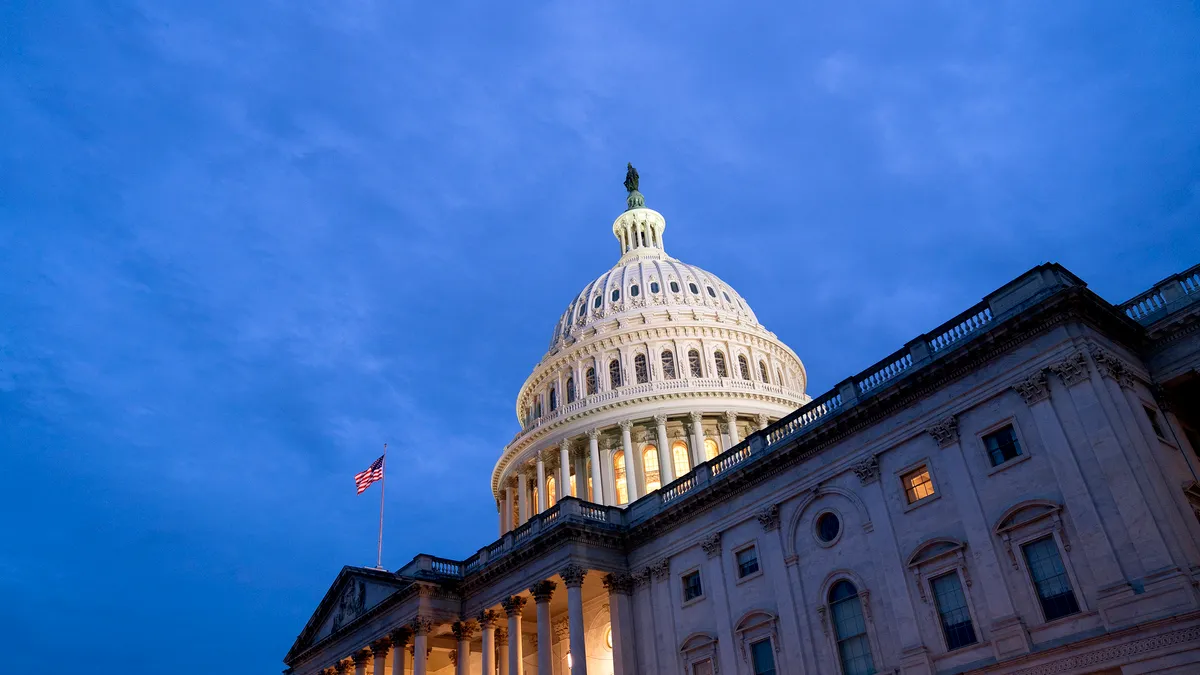Dive Brief:
- Associated Builders and Contractors has amassed a six-figure war chest to fight the use of mandated project labor agreements on federally funded infrastructure jobs.
- Through Build America Local, a coalition of construction industry and business organizations led by ABC, the trade group has produced a 30-second commercial as part of an advocacy campaign aimed at the public and members of the U.S. Senate on PLAs, which it claims reduce competition and increase costs on projects.
- "As Congress works to craft infrastructure legislation, it is critical for the U.S. Senate to oppose government-mandated PLAs so all qualified contractors and construction workers have the ability to fairly compete and build America's infrastructure," said Ben Brubeck, ABC vice president of regulatory, labor and state affairs, in a statement. "Ensuring fair and open competition on taxpayer-funded construction projects will ultimately result in savings to taxpayers, more opportunities for all qualified small businesses, minorities and women in the construction industry and the construction of more quality infrastructure projects so America can build back better and faster."
Dive Insight:
Project labor agreements are collective bargaining agreements that apply to a specific construction project, and only last for as long as the project does. In general, they virtually guarantee that a project uses union labor.
Some government contracts already require the use of PLAs; but private firms can too. For example, Toyota and Walmart have used them in the past.
Proponents of PLAs, such as the AFL-CIO trade union, argue that PLAs protect taxpayers by eliminating costly delays due to labor conflicts or shortages of skilled workers, because unions can quickly supply the labor needed. The group also claims that PLAs help improve the terms and conditions of employment for all craft workers — union and nonunion.
For example, the Massachusetts Building Trades Council, a coalition of 62 union groups representing more than 75,000 working men and women across the state, recently touted the signing of a PLA with Vineyard Wind, an 800-megawatt wind project located 15 miles off the coast of Martha's Vineyard, the first commercial-scale offshore project of its kind in the United States.
"We can build back better with renewable energy and create union jobs at the same time," said Frank Callahan, president of MBTC, in a statement.
A non-partisan analysis by the Office of Legislative Research for the Connecticut General Assembly found that benefits of PLAs included:
- Providing uniform wages, benefits, overtime pay, hours, working conditions and rules for work on major construction projects.
- Providing contractors with a reliable and uninterrupted supply of qualified workers at predictable costs.
- Ensuring that projects are completed on time and on budget due to the supply of qualified labor and relative ease of project management.
- Ensuring no labor strife by prohibiting strikes and lockouts.
- Making large projects easier to manage by placing unions under one contract.
As part of its American Jobs Plan, President Joe Biden's administration has proposed using PLAs on federally funded infrastructure jobs. Biden has also voiced support for the pro-union Protect the Right to Organize (PRO Act) and has called himself a friend of unions.
But ABC, as well as the Associated General Contractors of America, both of which are funded by construction employers, have voiced strong opposition to the PRO Act and PLAs, especially in the context of the infrastructure debate currently playing out in Washington, D.C.
ABC's announcement of its education campaign listed elements of PLAs that it characterized as discouraging competition via a "rigged bidding process" that forces contractors to:
- Use union hiring halls to obtain most or all workers instead of their existing workforce.
- Obtain apprentices exclusively from union apprenticeship programs.
- Follow "inefficient" union work rules.
- Pay into union benefit and multi-employer pension plans that any limited number of nonunion employees permitted on the project will be unlikely to access unless they join a union and vest in these plans.
- Require their existing workforce to accept union representation, pay union dues and/or join a union as a condition of employment on a PLA jobsite and receiving benefits, resulting in an estimated 20% hit to the paychecks of local craft professionals.
As the negotiating over a bipartisan infrastructure deal continues in Washington, whether PLAs are included is sure to remain a key issue, as Democrats push to include them and construction employer organizations like ABC fight to make sure they aren't.














